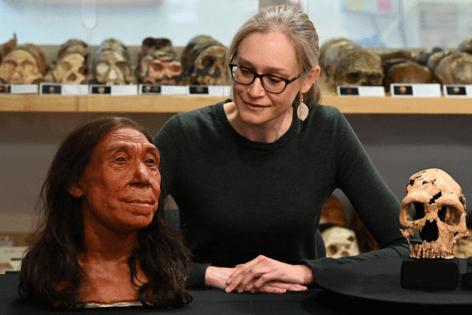Commentary: Should AI be used to resurrect extinct species like the Neanderthal?
Published in Op Eds
As science continues its evolution, discoveries and technologies can act like a master key that opens doors that lead to novel advancements. Artificial intelligence is one such key, making innovations possible by solving complex problems, automating tasks and enabling research that would have been impossible, or very time-consuming, without it.
But do we want to do research on all topics, and shall we try the AI master key on every door? To explore this question, let’s consider the use of AI by genomics experts as an example.
In recent years, genomics experts have added unbelievable depth to what we know about the world and ourselves. For example, genetics researchers have revealed facts about when certain animals and plants were domesticated. In another example, DNA found in 30,000-year-old permafrost was used to create fertile samples of a plant called narrow-leafed campion.
Importantly, genetic engineering techniques such as CRISPR facilitate extraordinary advances in the treatment of complicated conditions, such as sickle-cell anemia.
Thanks to AI developments, we are witnessing a dramatic increase in the pace and scalability of genomic techniques, which will allow researchers to embark on exploratory journeys — and at the same time, add urgency to already-existing ethical issues. AI companies are also most interested in the scientific implications of this technology. We see this demonstrated in a recent interview between Harvard Business School officials and OpenAI CEO Sam Altman. In response to the question, “What are the pieces of AI that you are most excited about?” Altman said: “Greatly increasing the rate of scientific discovery is what I’m most excited about.”
However, given the risks and possible consequences of AI use in science, should we rush headlong into using AI in all kinds of projects?
One relevant example is research on Neanderthals, our closest relatives, who lived until about 40,000 years ago. Neanderthals have been studied for several years now through genetic investigation of their fossils and their DNA. Genetic engineering can potentially use ancient DNA and genome editing methods to re-create a Neanderthal or aspects of a Neanderthal’s genetics and physiology.
To do this, scientists could start by figuring out the DNA sequence of a Neanderthal by comparing it with the DNA of modern humans, since they are closely related. Then, scientists could use CRISPR to swap out parts of human DNA with Neanderthal DNA. This process would require a lot of trial and error and might not succeed soon, but based on what we know about genetics, if something is possible, AI can help make it happen faster, cheaper and with less effort.
Scientists are excited about these developments because they could facilitate new discoveries and open up many new research opportunities in genetic research.
With or without AI, research on Neanderthals will proceed, but the extraordinary power of AI could give the final push to these discoveries and facilitate this kind of resurrection. At that point, the scientific community must develop norms and guidelines about how to treat these resurrected beings with dispositions very similar to humans. We would need to carefully consider their rights and well-being almost in the same way as when humans are involved and not as research subjects or artifacts of scientific curiosity. These ethical issues are discussed in more detail in a new paper published in the journal Nature Machine Intelligence.
A more holistic question to consider is: Should we prioritize the use of resource-intensive AI, researchers’ time and public funds to resurrect extinct beings? Or should we invest these resources into conserving species that are critically endangered today to prevent biodiversity from more degradation?
_____
Mohammad Hosseini, Ph.D., is an assistant professor in the Department of Preventive Medicine at Northwestern University’s Feinberg School of Medicine.
_____
©2024 Chicago Tribune. Visit at chicagotribune.com. Distributed by Tribune Content Agency, LLC.




























































Comments